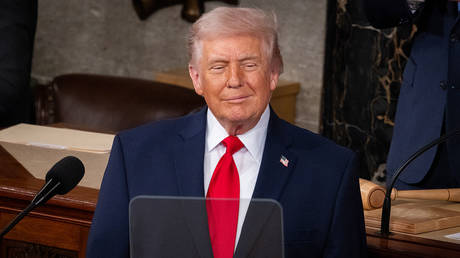
The new rules limit military commanders’ autonomy regarding targeted killings outside war zones
The Biden administration has revised its policy on counterterrorism drone strikes outside war zones in an effort to minimize casualties, a senior administration official speaking on condition of anonymity told the New York Times on Friday, citing a classified strategy memo signed by the president.
The new policy does not apply to combat operations in Iraq and Syria, which remain classed as war zones by the administration as the US is allegedly still fighting remnants of the Islamic State (IS, formerly ISIS/ISIL) terror group there. However, the new rules will limit US action in hotspots like Yemen and Pakistan, as well as Afghanistan, where Washington officially ended its involvement last year but which remains wracked with conflict.
Under the new policy, the president’s approval will be required to add a suspected terrorist to the list of those who can be targeted for death from above, and any such target must be considered a “continuing and imminent threat to US persons,” the official said. “Signature strikes,” in which a person can be remotely killed just because the drone operator thinks their behavior resembles that of a terrorist, are technically rendered off-limits, though a loophole allowing “self-defense” strikes on behalf of partner forces remains open.
The revised policy reinstates a requirement of “near certainty” that no civilians will be harmed in a strike, loosened under Biden’s predecessor Donald Trump, and encourages capture over killing where possible. Additionally, the military must secure the approval of the State Department chief of mission in the country where they plan to strike.
The policy supposedly declares the US will respect both domestic and international law with regard to its drone strikes in other countries, though it does not attempt to explain how this could be done without the consent of a country’s government and the absence of any UN Security Council resolution on the matter, as in Syria.
Homeland security adviser Liz Sherwood-Randall confirmed the existence of the new policy, though she declined to furnish any specifics to the Times, merely stating that it directed the government to “meet the highest standards of precision and rigor, including for identifying appropriate targets and minimizing civilian casualties.”
The US’ drone program is notorious for its levels of “collateral damage”. Classified documents leaked in 2015 revealed that as many as 90% of those killed in drone strikes were not the intended targets. Targeted drone killings began under the Bush administration following the terrorist attacks of September 11, 2001 and increased under Barack Obama and Donald Trump despite promises from each to end the previous administrations’ wars. The number of strikes conducted under Biden is not publicly known, as Trump ended the practice of publicly reporting such figures.




